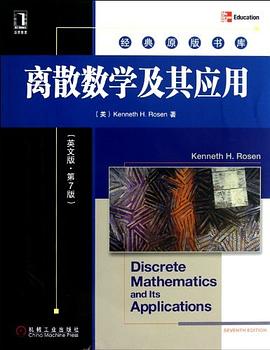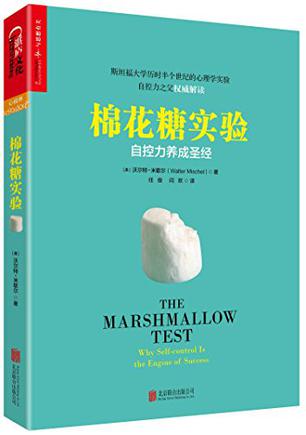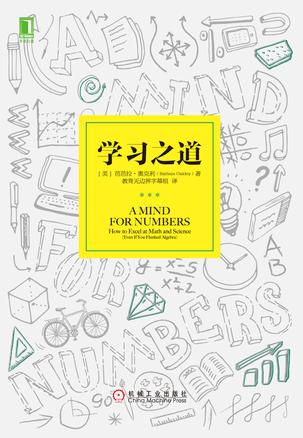内容简介
本书是介绍离散数学理论和方法的经典教材,已经成为采用率最高的离散数学教材,被美国众多名校用作教材,获得了极大的成功。中文版也已被国内大学广泛采用为教材。作者参考使用教师和学生的反馈,并结合自身对教育的洞察,对第7版做了大量的改进,使其成为更有效的教学工具。. 本书可作为1至2个学期的离散数学课入门教材,适用于数学,计算机科学。计算机工程.信息技术等专业的学生。
本书特点
实例:书中有800多个实例,用于阐明概念,联系不同内容,引入各种应用。
应用:书中叙述的应用展示了离散数学在解决现实问题中的使用价值,涉及的应用领域包括计算机科学、数据网络、心理学、化学、工程、语言学、生物学、商业和互联网等。
算法:离散数学的结论常常要用算法来表示,因此本书每一章都介绍了一些关键算法。
历史资料:本书对许多主题的背景作了简要介绍,并以脚注的形式给出了83位对离散数学做出过重要贡献的数学家和计算机科学家的简短传记。
关键术语和结论:每一章后面都列出了本章的关键术语和结论。
练习题、复习题和补充练习:书中有4000多道难度各异的练习题,可以满足不同层次学生的学习需求。同时,每章最后都有一组复习题和丰富多样的补充练习。
计算机课题:每一章后面还有一组计算机课题,大约有150个这样的题目,把学生已经学到的计算和离散数学的内容结合在一起。
计算和研究:每一章的结论部分都有一组计算和研究性问题,为学生提供了通过计算发现新事实或新思想的机会。
写作题目:每一章后面都有一组应该书面完成的题目。要完成这类题目,学生需要查阅参考文献,把数学概念和书面写作的过程结合在一起,以帮助学生研究和思考正文中没有深入探讨的思想,便于其未来的学习和研究。
......(更多)
作者简介
Rosen 博士于1972年获密歇根大学数学学士学位,1976年获麻省理工学院数学博士学位,其博士论文研究的是数论,导师是Harold Stark 。曾就职于科罗拉多大学、俄亥俄州立大学、缅因大学,后加盟贝尔实验室,现为AT&T实验室特别成员。他目前还是蒙茅斯大学客座研究教授,主要从事快速反应数据库项目的安全和保密方面的工作,同时教授密码应用课程。此外,他还是CRC出版社离散数学丛书的编辑顾问。
Rosen博士在专业期刊上发表过许多关于数论及数学建模的文章。《初等数论及其应用》和《离散数学及其应用》这两本书均被国际上几百所大学广为采用。
......(更多)
目录
《离散数学及其应用(英文版第7版)》
preface iv
about theauthor xiii
the companion website xiv
to the studentxvi
list of symbols xix
1 the foundations:logic and proofs
1.1 propositional logic
1.2 applications of propositional logic
1.3 propositional equivalences
1.4 predicates andquantifiers
1.5 nested quantifiers
1.6 rules of inference
1.7 introduction to proofs
1.8 proofmethods and strategy
end-of-chaptermaterial-
2 basic structures:sets,functions,sequences,sums,and matrices
2.1 sets
2.2 set operations
2.3 functions
.2.4 sequences and summations
2.5 cardinality of sets
2.6 matrices
end-of-chaptermaterial
3 algorithms
3.1 algorithms
3.2 the growth of functions
3.3 complexity of algofithms
end-of-chapter material
4 number theory and cryptography
4.1 divisibilitv andmodular arithmetic
4.2 integer representations andalgorithms
4.3 primesand greatest common divisors
4.4 solving congruences
4.5 applications of congruences
4.6 cryptography
end-of-chapter material
5 induction and recursion
5.1 mathematical induction
5.2 strong induction and well-ordering
5.3 recursive definitions and structural induction
5.4 recursive algorithms
5.5 program correctness
end-of-chapter material
6 counting
6.1 tlle basics of counting
6.2 the pigeonhole principle
6.3 permutations and combinations
6.4 binomial coefficients and identities
6.5 generalized permutations and combinations
6.6 generating permutations and combinations
end-of-chapter material
7 discrete probability
7.1 an introduction to discrete probability
7.2 probability theory
7.3 bayes’theorem
7.4 expected value and variance
end-of-chapter material
8 advanced counring technigues
8.1 applications of recurrence relations
8.2 solving linear recurrence relations
8.3 divide-and-conquer algorithms and recurrence relations
8.4 generating functions
8.5 inclusion-exclusion
8.6 applications of inclusion-exclusion
end—of-chapter material
9 relations
9.1 relations and their properties
9.2 n-ary relations and theirapplications
9.3 representing relations
9.4 closures of relations
9.5 equivalence relations
9.6 partial orderings
end-of-chapter material
10 graphs
10.1 graphs andgraphmodels
10.2 graph terminology and special types of graphs
10.3 representing graphs and graph isomorphism
10.4 connectivity
10.5 eulerandhamiltonpaths
10.6 shortest.pathproblems
10.7 planargraphs
10.8 graphcoloring
end-of-chapter material
11 trees
11.1 introduction to trees
11.2 applications of trees
11.3 tree travcrsal
11.4 spanning trees
11.5 minimum spanning trees
end-of-chapter material
12 boolean algebra
12.1 boolean functions
12.2 representing boolean functions
12.3 logic gates
12.4 minimization of circuits
end-of-chapter material
13 modeling cornputation
13.1 languagesand grammars
13.2 finite-state machines with output
13.3 finite-state machines with no output
13.4 languagerecognition
13.5 turing machines
end-of-chapter material
appendixes
1 axioms for the real numbers and the positive integers
2 exponential and logarithmic functions
3 pseudocode
suggestedreadings b-1
answers to odd-numbered exercises s-1
photo credits c-1
index ofbiographies i-1
index i-2
......(更多)
读书文摘
1,assigning truth values to more complicated expressions... 2,...which translate into symbols as ... 3,It has to do with...
证明:如果n是不能被2或3整除的整数,则n^2 - 1能被24整除
......(更多)






